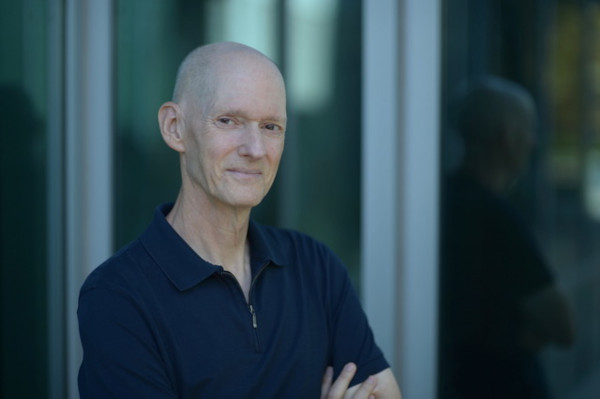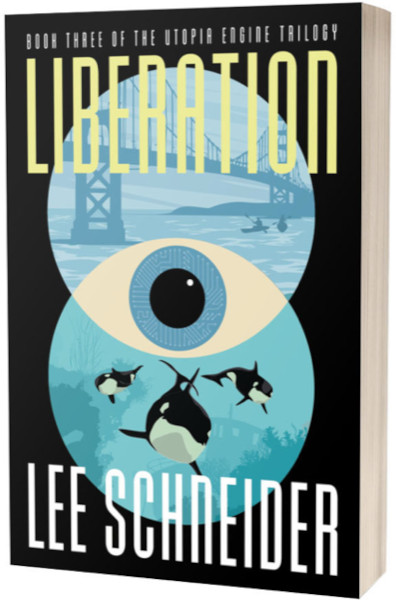
# Please introduce yourself and your book(s)!
Hi, I’m Lee Schneider, a science fiction and fantasy author with a long career in television and film production. My latest book LIBERATION is book three of the Utopia Engine trilogy, which I started more than three years ago. So much has changed in that time, I find that the more outlandish ideas I dream up, the faster they seem to come true.
The new book begins in 2053 when a massive network outage shuts down global power generation, transport, water purification, and the AI that controls the climate. My main character leads a resistance movement fighting the AI company runs everything, controlling nearly every aspect of people’s lives.
I started writing the trilogy when California, where I live, was smothered in smoke because of wildfires. I’m an avid runner who couldn’t go outside to run, so I opened a notebook and started writing down ideas about the climate crisis. An artificial intelligence that could manipulate the weather seemed a strange idea that would only exist far in the future. But startup founders are working on this technology now, along with many other ideas from the trilogy, including extracting thoughts from people’s minds, modifying humans with implanted chips and new programming, and top-down control of news and culture.
We’re headed into a time when we have crucial decisions to make about the technology we choose. It’s a time to question who has created the technology that is part of everything we do now and to wonder who really benefits from that technology. My focus in LIBERATION is on how the lead characters make those decisions about AI, corporate control of information and memory, and weaponized uses of weather control. It’s good to watch characters in a novel struggle with these issues so we might get some ideas about how to deal with them ourselves.
In addition to my science fiction novels, I am also the host and producer of the podcast The Future Lab, where I interview authors, publishers and thought leaders about the state of science fiction and fantasy writing today.
Earlier in my career, I wrote television news and talk shows, like Good Morning America, screenplays and stage plays, and documentaries for the History Channel and the Learning Channel. Just to round things out, I am also the founder of Red Cup Agency, a podcast production agency, and am the Artistic Director of FutureX, a platform for futurist projects.
# What inspires/inspired your creativity?
My mother was an artist who worked ferociously. Her drive to create sculpture was her reason for being. I borrow some of her fierceness every day to write novels. I’ve made various kinds of media through the years, but novels, for me, are the most complete form because they truly live inside the reader’s head. The reader creates the world that I try to suggest with words.
# How do you deal with creative block?
I don’t deal with creative block because I don’t think it exists. On my writing days, I write. Some days, I’m great, and other days, I’m significantly less than great. If I don’t have the drive to start work right away, I’ll write whatever comes to mind in notebooks for a few pages; that usually gets things moving. I have a daily word count, usually 600 words for new material, more if I’m editing what I’ve already written. When I reach 600, it’s time to stop and save some words for the next day. It’s much harder for me to stop writing than to start.
# Do you have tips on choosing titles and covers?
I love using one-word titles on my books. In addition to LIBERATION, the other two books in my trilogy are SURRENDER and RESIST. One-word titles make designers happy and are easier for prospective readers to remember. A book cover has to work as a tiny thumbnail on Amazon and book-sized in your hand at a bookstore. People are drawn to faces, so you’ll often see the face of a character on a cover. That’s a good idea, but if that’s not right for your book, consider a scene from the book, rendered impressionistically, without spoilers. Abstract covers are wonderful if you’re already famous, or dead, or both.

# How has your creation process improved over time?
I have become a reasonable person. I don’t work all night. I start in the morning and end in the early afternoon.
# What were the best, worst and most surprising things you encountered during the entire process of completing your book(s)?
The best thing will always be sitting down (or standing, when I’m at my standing desk) and not expecting the characters to pull the narrative their way. When they insist on things happening their way, they are usually right. The worst thing, without a doubt, is trying to create short promotional copy. Twenty-five words of inspired hype are difficult, especially when writing about your own work. Most surprising? Certain characters will audition like actors for a role in the book. They won’t get out of my head. The characters in the Utopia Engine trilogy were certainly like that. I couldn’t stop thinking about the main character Kat Keeper, who appears in all three books, for example. She blamed herself for the global network outage that launches the story of LIBERATION, and for allowing the AI company MIND to gain control over almost everything that people did. (She, actually, funded the technology that led to the creation of MIND, a move she later regrets.) A character like Kat begins to chart her own course, demanding a place in scenes, directing her own action, and putting herself in tough situations as she tries to do the right thing and correct her mistakes as a startup founder.
The same thing happened with other characters in the book. In LIBERATION, the power of nature’s intelligence is represented by a pod of orcas and another pod of humpback whales, who have decided that it’s time to set humans straight about what we’re doing to the Earth. Once I started thinking about these animals, and included some of my own close encounters with whales in Hawaii, I knew I had the sorts of characters I like to write about.
# What role do emotions play in creativity?
I used to write novels from detailed outlines, but I found out that when I was about halfway through the project, the characters were able to feel more of the story than I could. Scenes that looked good in the outline didn’t ring true, because I had tried to imagine the characters’ emotions before they had lived the scenes. I don’t plan creative work as much, but I still work from outlines.
# Do you have any creativity tricks?
To write these three books, I worked from deep research. Preparing the world of the Utopia Engine trilogy meant reading scientific papers about AI, diving into animal intelligence studies, and absorbing accounts of living with orcas and dolphins. I spoke to folks who were avid kayakers about what that is like. I spoke to a computer server expert. I look at history, too. There was a Luddite anti-technology movement a few hundred years ago that has relevance today. There was an architectural movement in Japan in the 1970s that could show the way to making better cities now. I’ve also read many accounts of how urban planners have responded to the climate crisis. Knowing the real basis of my ideas gives he a strong foundation and makes them all the more fun to spin into fiction.
# What are your plans for future books?
After writing the long arc of these three books, SURRENDER, RESIST, and LIBERATION, I got the taste for big stories with big emotions that unfold over years. Since I also like throwing a challenge out to myself, I’ve started a new trilogy fantasy series that doesn’t have a lot of technology in it but does have a lot of nature. Since this new series of books is for young readers, I get to explore a different set of feelings, like first love. Like the Utopia Engine trilogy, I am listening to the characters as they audition for their roles and try to direct their own scenes.